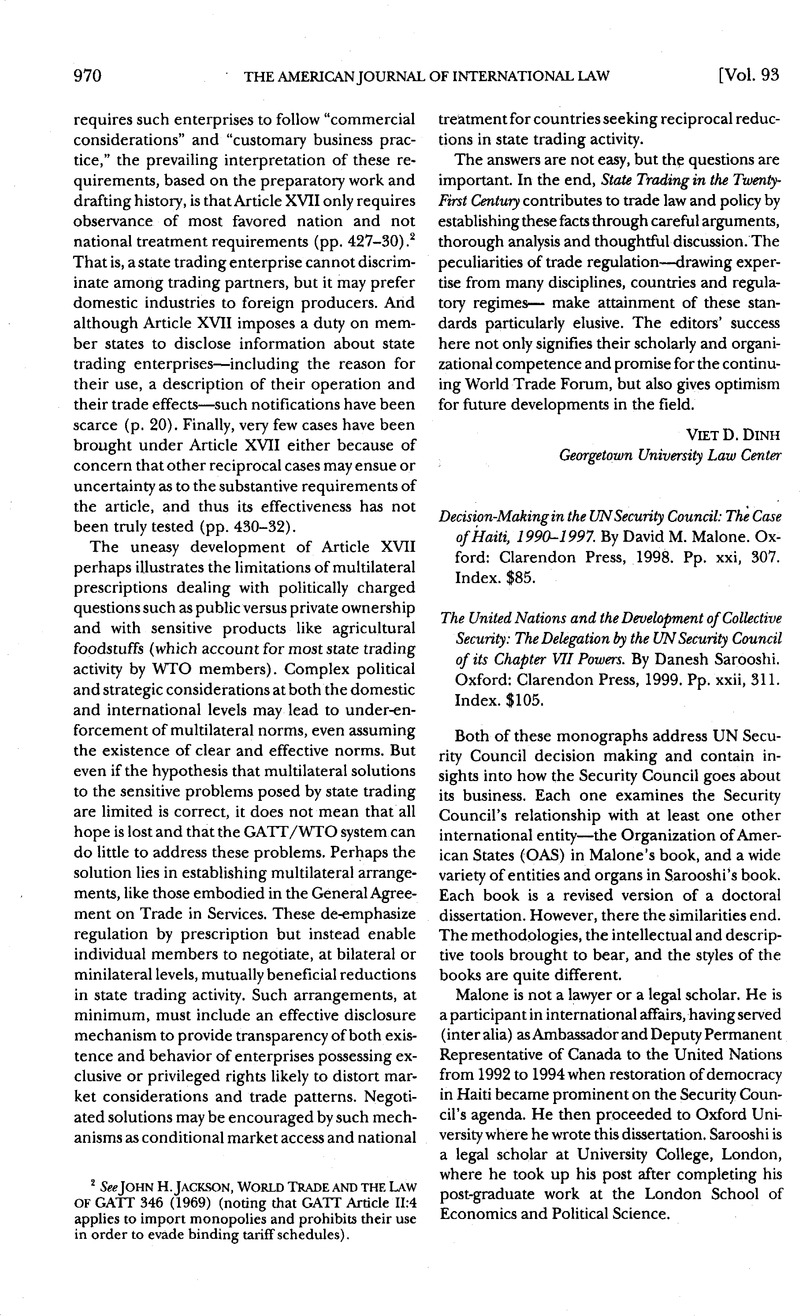No CrossRef data available.
Article contents
Decision-Making in the UN Security Council: The Case of Haiti, 1990-1997. By David M. Malone. Oxford: Clarendon Press, 1998. Pp. xxi, 307. Index. $85. - The United Nations and the Development of Collective Security: The Delegation by the UN Security Council of its Chapter VII Powers. By Danesh Sarooshi. Oxford: Clarendon Press, 1999. Pp. xxii, 311. Index. $105.
Published online by Cambridge University Press: 02 March 2017
Abstract

- Type
- Book Reviews and Notes
- Information
- Copyright
- Copyright © American Society of International Law 1999
References
1 See, for example, the Security Council debate over the right of France to vote, despite UN Charter Art. 27(3), on a draft resolution that would have called on France to desist from holding a referendum on the island of Mayotte to determine whether it wished to remain an overseas territory of France even though the archipelago of which it is a part had been admitted to UN membership as a single Comorian state, UN Doc. S/PV.1888, at 28–31 (1976).
2 Both quoted phrases first appeared in SC Res. 83 (June 27, 1950), on assistance to the Republic of Korea in the Korean War. The former phrase was revised slighdy (“all necessary means”) in SC Res. 678, para. 2 (Nov. 29, 1990), reprinted in 29 ILM 1565 (1990), authorizing the use for force in the Persian Gulf War. It has also been used, sometimes with further slight revisions, to authorize more recent uses of force, as outlined in Chapter 5 of Sarooshi’s book. The latter phrase (“to restore international peace and security in the area”) was copied verbatim in SC Res. 678 and—as in the case of SC Res. 83—was used to justify carrying the war beyond the borders of the state being defended.
3 See SC Res. 875 (Oct. 16, 1993).
4 For a less sanguine assessment than Malone’s, see Richard A. Falk, The Haiti Intervention: A Dangerous World Order Precedent for the United Nations, 36 Harv. Int’l L.J. 341 (1995).
5 Sarooshi says that there is another condition the Security Council must meet for a lawful delegation of Chapter VII powers: specification of a clear objective for which the power is delegated (pp. 155, 250).
6 See D. W. Bowett, United Nations Forces 38 (1964); 2 Rosalyn Higgins, United Nations Peacekeeping 1946–1967, at 246 (1970).
7 International Tribunal for the Prosecution of Persons Responsible for Serious Violations of International Humanitarian Law Committed in the Territory of the Former Yugoslavia since 1991, Statute, UN Doc. S/25704, annex (1993), reprinted in 32 ILM 1192 (1993).
8 International Criminal Tribunal for the Prosecution of Persons Responsible for Genocide and Other Serious Violations of International Humanitarian Law Committed in the Territory of Rwanda and Rwandan Citizens Responsible for Genocide and other such Violations Committed in the Territory of Neighbouring States, between 1 January 1994 and 31 December 1994, Statute, SC Res. 955, annex UN SCOR, 49th Sess., Res. & Dec, at 15 UN Doc. S/INF/50 (1994), repiinted in 33 ILM 1602 (1994).




